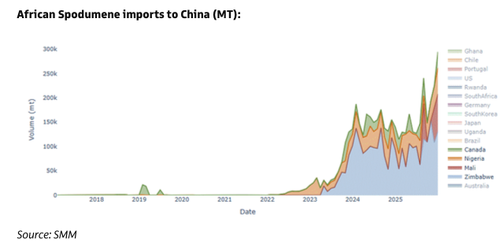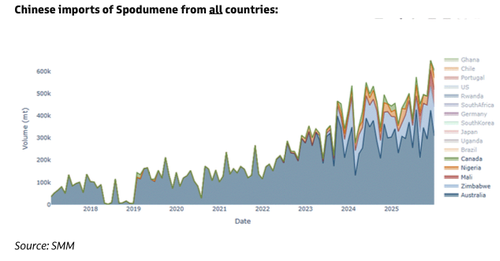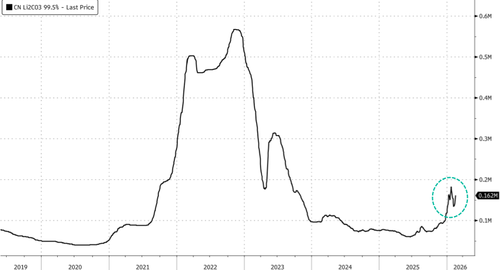Zimbabwe Lithium Disruption Has Goldman Eyeing This Trade
Earlier news from Bloomberg that Zimbabwe has suspended exports of lithium concentrates and raw minerals to force miners into local processing has caught the attention of Goldman analyst James McGeoch. He sees a potential trading opportunity in a mineral-exploration company that could be positioned for upside.
Let's begin with the report that Mines Minister Polite Kambamura told reporters earlier that the export ban is effective immediately until further notice. Zimbabwe has one of the largest lithium reserves in Africa and is among the top global producers.
Zimbabwe Suspends Export of Raw Minerals and Lithium Concentrates.
— Zimbabwe Economic Review (@ZimbabweReview) February 25, 2026
Mines Minister Hon. Dr. P. Kambamura has ordered the immediate suspension of all exports of raw minerals and lithium concentrates, including consignments already in transit, to enforce in-country value addition… pic.twitter.com/acX0CmntoX
IMMEDIATE SUSPENSION OF EXPORT OF RAW MATERIALS AND LITHIUM CONCENTRATES
— Nick Mangwana (@nickmangwana) February 25, 2026
The Minister of Mines and Mining Development, Hon. Dr. P. Kambamura (MP), has announced an immediate suspension on the export of all raw minerals and lithium concentrates, effective immediately.… pic.twitter.com/Mw1Ua4yfIl
Zimbabwe has become a global powerhouse in supplying lithium to Chinese refineries.
The latest USGS data shows Zimbabwe produced an estimated 22,000 metric tons of lithium in 2024, versus a reported world total of 240,000 metric tons. That works out to about 9.2% of reported global mine output.
Such a disruption piqued McGeoch's interest:
REMEMBER this : Its Africa - recetn example is Cobalt - Feb 2025 put an export ban in place, Oct 2025 they announced export quotas, rolled them forward into 2026 - end Feb they have exported c.3k tonnes v typical of 20kt. Expect the mkt will price this disruption as per the below and there was already a willingness/desire to own Lithium which will amplify basis this.
Continue to point to GSCBGLLI Index...... Want a small cap i have been keeping an eye on QTWO CN
McGeoch pointed out Zimbabwe's trade and production data and how Chinese lithium prices are already reacting to the disruption:
In terms of production, GIR had forecast 160kt LCE (Lithium Carbonate Equivalent) of production in Zimbabwe for 2026 – this accounts for roughly 10% of ex-China supply.
To put this chart into context, in LCE terms, 2025 exports of Zimbabwe Spodumene to China totalled 160kt LCE, virtually all their production.
What does this mean for price action?
Post Chinese New Year holiday, GFEX prices were up 10% (close on close), evidence of supported prices before this headline in an already fundamentally tight market. On the Wuxi exchange (a private onshore exchange that trades around the clock), lithium carbonate prices have rallied 14% today post-headline, from roughly 160k CNY/MT to 185k CNY/MT. We expect GFEX prices (onshore lithium carbonate exchange) to move higher on this tomorrow.
McGeoch wrote in a separate note, "Zim is the marginal spodumene supplier. The ban will only be lifted if miners comply with government requirements. ...Zim is 8% on our 2026 supply numbers."
He added:
Team just running some numbers. More recently the Lithium price closed today at RMB 166k , we are 13% off the highs of 190k in Jan. Clearly will be limit up, WUXI is +12% on this headline. already .... We expect new highs without a doubt here, China came back and bought it pre this headline, now we all catch up. Its been an ESS story and i see that theme getting stronger not weaker.
Here is where China's 99.5% battery-grade lithium carbonate prices stand after the 2021-22 boom-and-bust.
McGeoch and Goldman's commodities desk have certainly taken an interest in lithium this morning. Professional subscribers can read the full note at our new Marketdesk.ai portal.
Tyler Durden Thu, 02/26/2026 - 07:45






 Presidents Putin and Cyril Ramaphosa, via TASS.
Presidents Putin and Cyril Ramaphosa, via TASS.

Recent comments